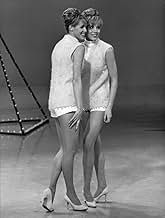Ellen Kessler
- Actress
- Soundtrack
German twin sisters Alice and Ellen Kessler reached the peak of their popularity in the 1950s and 60s. Their parents, mechanical engineer Paul Kessler and his wife Elsa, encouraged their daughters' artistic inclinations from early childhood and enrolled them in ballet classes. By 1950, the sisters had graduated from opera school in Leipzig. Soon after, they took advantage of a visiting permit by defecting from their native Saxony in the GDR to West Germany. At the Düsseldorf Palladium, the duo made their professional debut as singer/dancers and began to be featured on screen in several German musicals and romances. In 1955, Alice and Ellen were recruited by the director of the Paris Lido, Pierre Louis-Guérin, to join his Bluebell Girls in Varieté on the Champs-Élysées. Blonde, unusually tall (at 1.78cm) and long-legged, the twins enjoyed great popularity during their five-year long tenure on the Parisian stage.
In 1959, Alice and Ellen represented West Germany at The Eurovision Song Contest (1959), reaching 8th place. In the early sixties, they made several recordings for the Polydor label in German, French and Italian, which were modestly successful. They fared better after becoming featured performers on the Italian RAI TV musical program Studio Uno (1961), their rendition of "Dadaumpa" being adopted as the show's theme song. In 1962, the twins had settled in Italy where they attained iconic status as 'Le gemelle Kessler'. The following year saw them on the cover of Life Magazine. At the age of 40, Alice and Ellen posed nude on the cover of the Italian edition of Playboy Magazine which sold out in record time.
Between 1963 and the early seventies, their popularity extended to the other side of the Atlantic, the twins performing as guests on variety shows like The Red Skelton Hour (1951), The Danny Kaye Show (1963), The Hollywood Palace (1964) and (multiple times) on The Ed Sullivan Show (1948). In private life, the Kesslers rebuffed many advances from various prominent American actors (including Elvis). An exception was a brief liaison between Ellen and Burt Lancaster, chronicled in 1996 for the German Stern magazine. Having decided to remain single, the twins moved back to Germany in 1986 to set up residence in the affluent suburb of Geiselgasteig, the 'Bavarian Hollywood', near Munich. Still inseparable, their apartments are said to be divided only by a sliding door.
The Kessler Twins have received multiple awards, including Montreux's Rose D'or and the Order of Merit of the Federal Republic of Germany.
In 1959, Alice and Ellen represented West Germany at The Eurovision Song Contest (1959), reaching 8th place. In the early sixties, they made several recordings for the Polydor label in German, French and Italian, which were modestly successful. They fared better after becoming featured performers on the Italian RAI TV musical program Studio Uno (1961), their rendition of "Dadaumpa" being adopted as the show's theme song. In 1962, the twins had settled in Italy where they attained iconic status as 'Le gemelle Kessler'. The following year saw them on the cover of Life Magazine. At the age of 40, Alice and Ellen posed nude on the cover of the Italian edition of Playboy Magazine which sold out in record time.
Between 1963 and the early seventies, their popularity extended to the other side of the Atlantic, the twins performing as guests on variety shows like The Red Skelton Hour (1951), The Danny Kaye Show (1963), The Hollywood Palace (1964) and (multiple times) on The Ed Sullivan Show (1948). In private life, the Kesslers rebuffed many advances from various prominent American actors (including Elvis). An exception was a brief liaison between Ellen and Burt Lancaster, chronicled in 1996 for the German Stern magazine. Having decided to remain single, the twins moved back to Germany in 1986 to set up residence in the affluent suburb of Geiselgasteig, the 'Bavarian Hollywood', near Munich. Still inseparable, their apartments are said to be divided only by a sliding door.
The Kessler Twins have received multiple awards, including Montreux's Rose D'or and the Order of Merit of the Federal Republic of Germany.



































